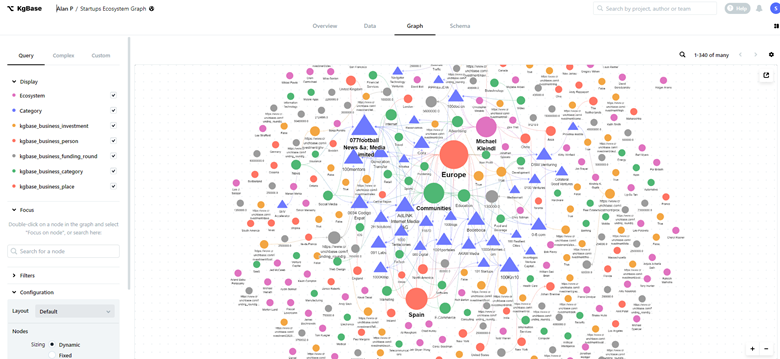No-Code Platforms for Open Platform Database Development: Save Time and Resources
No-Code Platforms for Open Platform Database Development: Save Time and Resources
Blog Article
Discover How Scalable Databases Can Be Used Without Coding to Boost Your Business Workflow
In today's hectic service setting, the capacity to take care of and assess information successfully is paramount. no-code. Scalable databases, particularly when matched with no-code services, provide a transformative technique that equips non-technical individuals to enhance procedures.
Understanding Scalable Data Sources
Scalable data sources are important for modern-day business operations, enabling companies to efficiently handle raising volumes of data without giving up performance. These databases are created to adjust and expand to the altering demands of a company, making sure that they can take care of larger datasets and more intricate queries as business needs develop.
Comprehending scalable data sources entails recognizing their two primary types: vertical scaling and horizontal scaling. Upright scaling, or "scaling up," includes including even more power (CPU, RAM) to an existing web server to boost efficiency. Alternatively, horizontal scaling, or "scaling out," entails adding more servers to distribute the load, which typically leads to higher versatility and fault tolerance.
One more vital element is the design of scalable databases, which can be either relational or non-relational. Relational databases, such as MySQL and PostgreSQL, are structured and utilize SQL for queries, while non-relational databases, like MongoDB and Cassandra, offer even more adaptability with disorganized information.
Eventually, comprehending scalable databases is vital for businesses aiming to leverage information as a critical property, allowing them to remain competitive in a significantly data-driven setting.

Advantages of No-Code Solutions
Unlocking the possibility of no-code services equips organizations to improve procedures and boost productivity without the requirement for extensive programs understanding. These systems enable non-technical individuals to develop, modify, and manage databases easily, thus democratizing access to modern technology across groups.
Among the primary benefits of no-code services is their speed of implementation. Services can promptly release applications and automate procedures, considerably minimizing the moment invested on development cycles. This agility enables organizations to respond immediately to market adjustments and consumer demands, cultivating a competitive edge.
Additionally, no-code platforms decrease reliance on IT departments for everyday tasks, allowing technical teams to focus on more complex projects that require specialized abilities. This change not just maximizes resource allotment but also promotes innovation within the organization.
Cost-effectiveness is another benefit, as no-code remedies can decrease growth and upkeep costs. By lessening the demand for coding expertise, companies can harness the capacities of their existing labor force without the expenses of employing additional personnel.
Popular No-Code Database Devices
The surge of no-code options has actually caused the development of various database devices that accommodate services seeking efficiency and accessibility. These tools empower customers with minimal technological proficiency to produce, manage, and manipulate data sources flawlessly.

Caspio stands out for its ability to construct internet applications without any type of coding. It enables companies to create robust data sources and release applications rapidly, catering to numerous sector requirements. Similarly, Knack supplies straightforward interfaces and powerful information administration capabilities, enabling companies to develop customized applications tailored to their operations.

Usage Instances in Organization Procedures
Exactly how can services take advantage of data source devices to boost their operations? Scalable data sources supply organizations with effective capabilities to handle and examine information without read the need for considerable coding expertise. These tools can streamline different business procedures, eventually leading to enhanced efficiency and performance.
One famous use case is customer partnership administration (CRM) Businesses can utilize scalable data sources to track client interactions, choices, and feedback, enabling tailored communication and far better solution. By centralizing this details, teams can team up much more properly and reply to consumer requirements in real-time.
Another considerable application is supply management. Companies can use no-code database devices to keep track of supply levels, track deliveries, and forecast need. This guarantees optimum inventory degrees, decreases waste, and decreases stockouts.
Furthermore, task administration can take advantage of scalable databases by permitting teams to take care of tasks, deadlines, and sources in an unified system. With real-time updates and data visualization, task managers can make educated choices.
Starting With Application
Implementing scalable data sources in business procedures requires an organized technique to guarantee effective combination and utilization. The very first step is to carry out a thorough demands analysis, identifying particular organization requirements, data types, and anticipated development patterns. This foundational understanding will lead the choice of the ideal data source service.
Following, pick an user-friendly, no-code database platform that lines up with your functional objectives. no-code. Numerous modern-day solutions offer instinctive user interfaces, allowing non-technical users to take care of information effectively. After selecting a click for more info platform, establish a clear data architecture that describes how data will be organized, accessed, and maintained
Training is essential; make sure that staff member are furnished with the needed skills to use the database. Consider providing workshops or tutorials to acquaint team with the system's capabilities.
Verdict
To conclude, the combination of scalable databases through no-code solutions offers substantial benefits for company operations. These systems encourage non-technical individuals to effectively manage and analyze information, promoting enhanced decision-making and partnership. By adopting devices such as Airtable and Idea, organizations can improve procedures and minimize reliance on IT resources. Inevitably, leveraging these innovations can lead to boosted productivity and functional effectiveness, positioning organizations for sustained development in an that site affordable landscape.
One prominent no-code database device is Airtable, which combines the functionality of a spread sheet with the power of a database.How can businesses utilize database tools to boost their operations? Services can utilize scalable databases to track consumer interactions, preferences, and responses, enabling tailored communication and much better solution.Executing scalable databases in business operations requires a structured approach to guarantee effective assimilation and utilization.In conclusion, the combination of scalable data sources via no-code solutions provides considerable benefits for organization operations.
Report this page